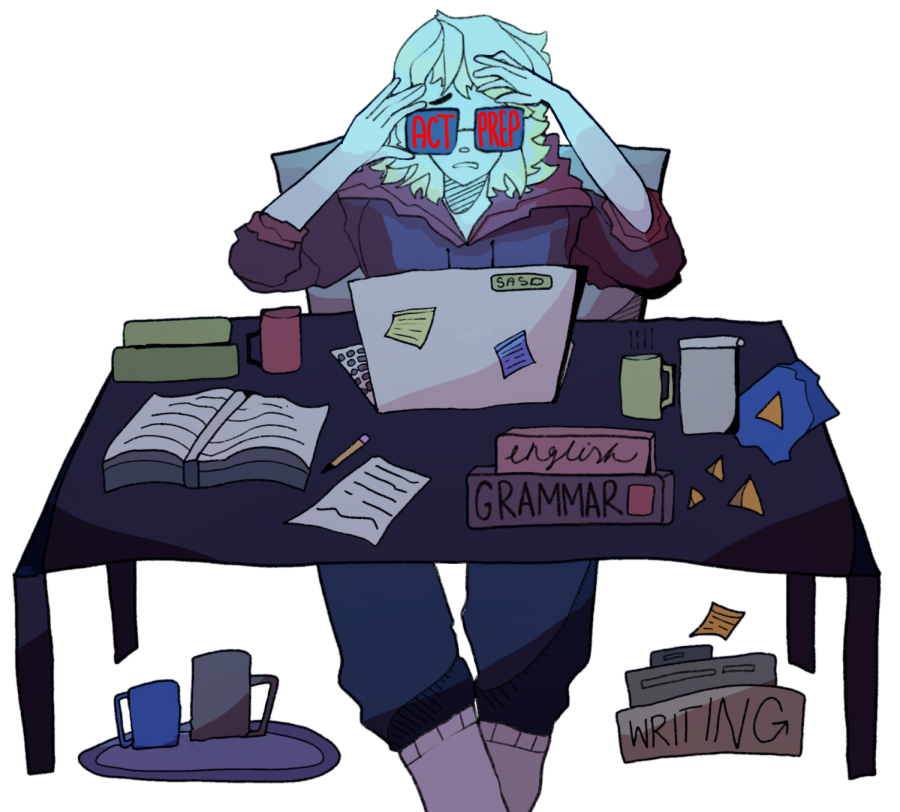Act Now For The ACT
March 7, the day freshmen, sophomores, and seniors take a large sigh of relief, while juniors prepare for a day filled with dread. 11th-grade students at Stoughton High School will be taking the ACT (American College Test), an entrance exam that colleges typically use to make admission decisions. It consists of four subcategories: mathematics, English, science, and reading—as well as an optional writing test. The highest score you can achieve is a 36, and two of our students here at SHS hope to earn just that.
Junior Piper Grant aims to do well on the test by practicing every day after school.
“I have an ACT program on my computer that I’m doing daily after school,” Grant says. “[It] includes lessons that start with videos, practice problems, and ends with practice tests.”
The program is run through the ACT website and is accessible to anyone that wants to practice, no matter their age or grade level. Taking full advantage of this website, Grant encourages others to do the same.
“I think I’ll do best on the reading or science section,” Grant says. “I’ve done better on those, but the math tests weren’t great.”
Aiming to get plenty of practice before the test—particularly in mathematics—Grant urges underclassmen to do the same.
“I would tell underclassmen that they should take time starting way before the ACT to just do a little bit each day after school, or each week, or whatever time they can spare,” Grant says. “[It] doesn’t have to be every day, but put in a little bit of effort for a long time so that you’re more than ready for the test instead of just diving in like, ‘Well, I hope this works!’ because this is the one test where you probably shouldn’t wing it.”
Although Grant—as well as most juniors—isn’t excited to take the ACT, she acknowledges that it plays a role in determining her educational future.
“If you have the opportunity to prepare, that’s going to be good for you,” Grant says.
While the ACT website provided plenty of practice for Grant, she also gives credit to classes here at SHS for assistance in preparation.
“AP Biology has definitely helped me,” Grant says. “The tests have not only helped me prepare for the ACT, but for the AP exam, as well. The writing in AP World History has also helped me prepare for [the] essay portion on the ACT.” Grant hasn’t been the only one preparing for the upcoming test. Junior Kyle Gibson has also been taking the past couple of weeks to prepare for the upcoming ACT.
“I’ve got two three-inch thick study books that are really hefty,” Gibson says. “They have the different subjects for the ACT, so science, math, English, and grammar—as well as the practice tests. They also include prep guides for students who may not be sure how to prepare.”
Gibson is aiming for the top, hoping to get a near-perfect score on the ACT.
“I’m hoping for somewhere near a 33,” Gibson claims. “It might be a little ambitious, but above 30 and I’ll generally be happy. If it’s below 30, I’ll be a touch disappointed.”
In order to achieve such a high score, Gibson has been prepping as much as he can, even in topics he already feels confident about.
“I’ve always been better at math, which is interesting because, ironically enough, I actually did better in science on the PSAT (Preliminary Scholastic Aptitude Test) than math,” Gibson says. Even though Gibson has been prepping for a little more than a month, Gibson urges underclassmen to take a deep breath and relax.
“Don’t stress too much about it,” Gibson says. “Definitely study because it will come up on you faster than you expect, but it’s not as bad as you think.”
If you are worried about the ACT, Gibson suggests programs such as Xello and Methodize, allowing for easy itinerary-based prep.
While the ACT is a crucial test most students take—if they choose to do so—some colleges choose to ignore the score or neglect it in the first place. According to www.act.org, around 1,750 universities will have optional ACT/SAT score submissions, meaning that if you don’t test as well as you like, chances are you might not have to worry about it. Colleges that have optional submission make it clear that any score submitted will not negatively affect the applicant. However, if you do choose to take the test, prepare in whatever method’s best—even if it means cramming the night before.

Bode is a senior, and this is his second year on staff! He's the news editor. He joined to dive into something he was completely unfamiliar with. Outside...






